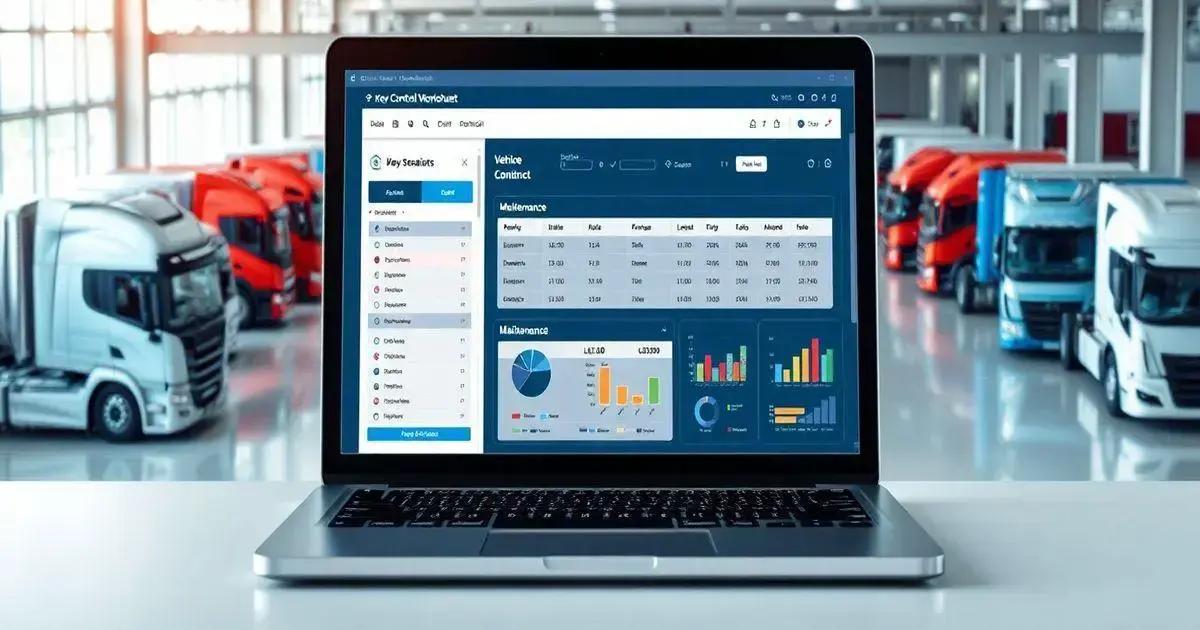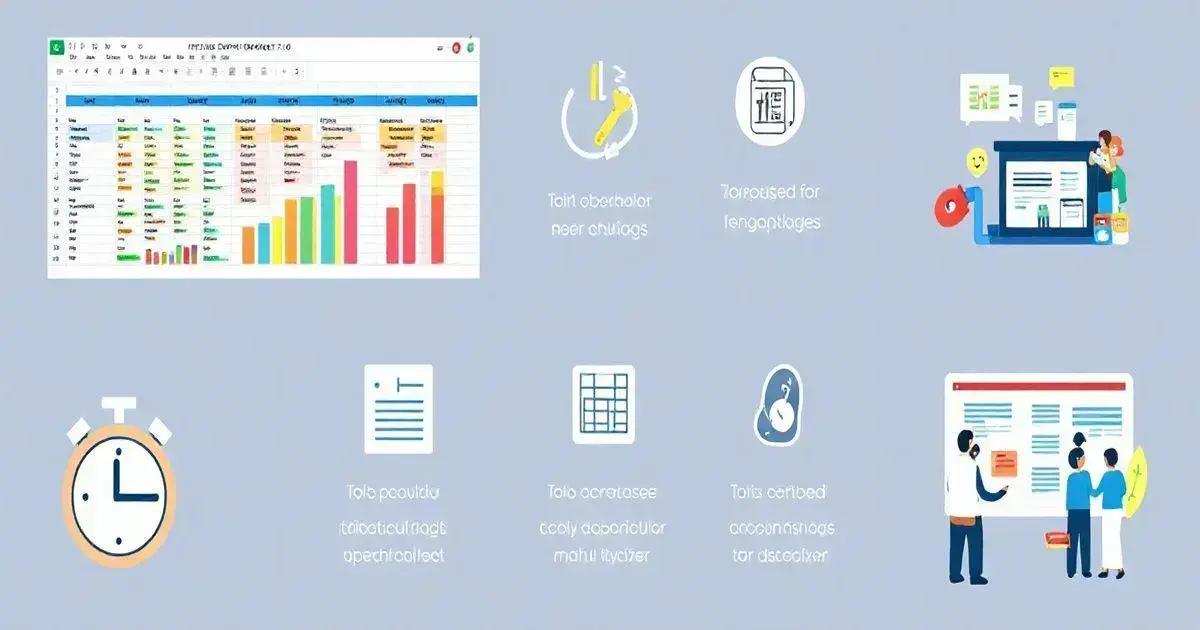Top 5 Features of the Fleet Control Worksheet 7.0 Leave a comment
The Fleet Control Worksheet 7.0 is a comprehensive fleet management tool that enhances efficiency through dashboards for monitoring vehicle and driver performance, extensive registration capabilities, document management for compliance, and robust travel and maintenance control features, making it essential for effective fleet operations.
The Fleet Control Worksheet 7.0 is an essential tool for efficient fleet management, providing a comprehensive solution for tracking vehicle performance, maintenance schedules, and more. With a user-friendly interface and powerful features, this spreadsheet template is designed to simplify your management tasks and enhance productivity.
Initial Dashboards Overview
The Fleet Control Worksheet 7.0 comes equipped with a variety of initial dashboards that provide a snapshot of your fleet’s performance. These dashboards are essential for fleet managers looking to monitor key metrics at a glance. Here’s a breakdown of what you can expect:
- KM by Driver: This metric shows the total kilometers driven by each driver, making it easy to assess performance and identify high-mileage drivers.
- KM per Vehicle: Analyze how many kilometers each vehicle in your fleet has traveled. This helps in understanding vehicle usage and planning for maintenance.
- KM per Liter: This dashboard feature tracks fuel efficiency, allowing you to see how many kilometers are driven per liter of fuel consumed, crucial for cost management.
- KM per Trip: Understand the average distance covered per trip. This can help in optimizing routes and reducing costs.
- Average Consumption per Vehicle: This feature highlights the average fuel consumption of each vehicle, providing insight into performance and potential issues with fuel efficiency.
- Average Consumption per Driver: Similar to vehicle consumption, this metric helps assess which drivers may be more fuel-efficient and which may need training on better driving practices.
- Total General, Preventive and Corrective Maintenance: Keeping track of all maintenance tasks is vital, and this metric summarizes both preventive and corrective maintenance activities.
- Maintenance Cost Average: This dashboard reveals the average maintenance costs incurred per vehicle, allowing for budget adjustments and cost analysis.
- Total cost of Mechanical and Electrical Maintenance: Understand the total expenditure on mechanical and electrical repairs, aiding in forecasting future costs.
- Total Tire Maintenance Cost: This feature tracks expenses associated with tire maintenance, important for managing overall fleet costs.
- Total Lubricant Cost: Monitor costs related to lubricants and fluids, which help maintain fleet efficiency.
- Average cost of Mechanical and Electrical Maintenance: Gain insights into the average costs for repairs, enabling better financial planning.
- Average Tire Maintenance Cost: Assess tire-related expenses on an average basis to optimize procurement strategies.
- Average cost with Lubricants: Understand the typical expenditure on lubricants for the fleet, which is crucial for overall maintenance budgeting.
- Vehicles in Transit: Track how many vehicles are currently on the road, which is essential for real-time management.
- Tires in Transit: Similar to vehicle tracking, knowing the status of tires is also critical for maintenance scheduling.
- Delayed Vehicle Documents: Keep an eye on vehicle documentation that is overdue, preventing potential legal issues.
- Delayed Driver Documents: Just like vehicle documents, managing driver paperwork is crucial for compliance and safety.
- Delayed Preventive Maintenance: Monitor any preventive maintenance tasks that are overdue, ensuring that necessary upkeep is performed on time.
- Total Cost Versus Shipping: This metric allows for a detailed comparison of total operational costs against shipping costs, helping to identify inefficiencies.
- Fuel, Maintenance and Other Costs: Consolidate all costs associated with running your fleet to better understand profitability and areas for improvement.
These dashboards not only provide essential metrics for day-to-day operations but also serve as valuable tools for strategic decision-making. By leveraging the insights available in the Fleet Control Worksheet 7.0, fleet managers can enhance productivity, optimize costs, and ensure that their fleet operates at peak performance.

Key Registrations for Fleet Management
Effective fleet management relies heavily on accurate data, and the Fleet Control Worksheet 7.0 provides you with essential registration features designed to streamline your operations. Here are the key registrations included in the worksheet:
Key Registrations for Fleet Management
- Driver Registration: Track essential driver information, including names, license numbers, contact information, and driving history. This ensures that you have all necessary details for each driver in your fleet.
- Vehicle Type Registration: Maintain a comprehensive list of all vehicle types in your fleet. This registration allows for better categorization and management of different vehicles based on their specifications and functionalities.
- Mechanical and Electrical Services Registry: Keep records of all mechanical and electrical services performed on each vehicle, ensuring that you can track service history and upcoming maintenance needs.
- Tree Service Registration: Track the different types of tree services provided to each vehicle, helping to manage any specialized maintenance or repairs that are required.
- Lubricant Services Register: Maintain records of all lubricant services performed on each vehicle, including oil changes and other fluid top-ups, which are essential for maintaining vehicle performance.
- Register of Workshops and Suppliers: Keep a list of all workshops and suppliers utilized for vehicle maintenance, ensuring you know where to go for repairs and parts when needed.
- Expenditure Type Register: Categorize and track various types of expenditures related to fleet operations, from maintenance costs to fuel expenses, allowing for better budget management.
- Refueling Station Registration: Maintain a list of refueling stations used by your fleet. This helps in planning fuel stops and optimizing fuel purchases.
- Fuel Type Register: Track the types of fuel used by different vehicles, ensuring that each vehicle is using the correct fuel type for optimal performance.
By utilizing these key registrations within the Fleet Control Worksheet 7.0, fleet managers can effectively monitor all aspects of their fleet, ensuring enhanced efficiency, safety, and compliance. Accurate and comprehensive data is crucial for informed decision-making and maintaining a high-performing fleet.
Document Management Features
Managing a fleet involves not just vehicles and drivers, but also a mountain of important documents. The Fleet Control Worksheet 7.0 includes robust document management features to help you keep everything organized and accessible. Here’s what you can expect:
Document Management Features
- Driver Document Control: This feature allows you to track and manage all essential documents for each driver, including licenses, insurance papers, medical certificates, and training records. Keeping this information easily accessible helps ensure compliance and enhances safety.
- Vehicle Document Control: Similar to driver documents, the worksheet enables you to manage all documents related to each vehicle, such as registration papers, insurance details, and inspection certificates. This ensures that all vehicles have the necessary documentation and helps track expiration dates.
These document management features are crucial for maintaining compliance with regulations and ensuring that your fleet operates smoothly. By regularly updating and reviewing these documents, fleet managers can prevent lapses in coverage and avoid potential legal issues.
Utilizing the Fleet Control Worksheet 7.0 for document management not only saves time but also enhances accountability and oversight within the fleet management process. A well-organized document system helps in tracking renewals and critical deadlines, ensuring that nothing falls through the cracks.

Travel Control Capabilities
The Fleet Control Worksheet 7.0 offers comprehensive travel control capabilities designed to provide insight into your fleet’s travel activities. These features help fleet managers monitor operations effectively, ensuring everything runs smoothly on the road. Here are the key travel control capabilities:
Travel Control Capabilities
- Cargo Control Linked to Trips: Track and manage all cargo associated with each trip, ensuring accountability and accurate reporting. This feature helps in identifying cargo types, quantities, and any special handling requirements.
- Vehicle Control: Monitor which vehicles are in use for specific trips, allowing for real-time tracking and management of your fleet’s assets. This control helps in optimizing vehicle assignments and ensuring that vehicle utilization is maximized.
- Driver Control: Keep track of which drivers are assigned to each trip, ensuring that you have the right personnel on the road. This feature is essential for managing driver schedules and performance evaluations.
- Supply Control: Manage and track all supplies needed for travel, including fuel, food, and necessary equipment. This helps in planning for long trips and ensures that drivers are well-equipped.
- Control of All Travel Expenses: Capture and categorize all expenses related to travel, such as fuel costs, tolls, and accommodations. This capability provides a comprehensive view of travel-related expenditures, aiding in budget management and cost analysis.
By utilizing these travel control capabilities within the Fleet Control Worksheet 7.0, fleet managers gain greater visibility and control over their operations. This not only enhances efficiency but also enables proactive management of resources, ensuring that all trips are conducted safely and cost-effectively.
Incorporating these features into your fleet management strategy can lead to significant improvements in operational performance, helping to streamline processes and reduce unnecessary expenses.
Maintenance Control and Analysis
Effective maintenance control is crucial for any fleet operation, and the Fleet Control Worksheet 7.0 provides comprehensive tools for managing and analyzing maintenance tasks. Here’s how the worksheet supports your maintenance efforts:
Maintenance Control and Analysis
- Corrective and Preventive Maintenance Type: The worksheet allows you to categorize maintenance into corrective (repairs) and preventive (scheduled upkeep) types. This distinction helps fleet managers ensure that all maintenance activities are tracked and completed on time.
- Maintenance by Vehicle: Each vehicle can be monitored for its specific maintenance history. This feature helps in understanding the unique maintenance needs of different vehicles based on their usage and performance, facilitating tailored maintenance strategies.
- Maintenance by Mechanical and Electrical Type, Tire and Lubricants: Track maintenance tasks related to various categories, including mechanical, electrical, tire-related services, and lubricant changes. This comprehensive tracking ensures that no aspect of vehicle maintenance is overlooked.
- Maintenance Cost: Capture and analyze the costs associated with maintenance activities. This capability is essential for budgeting and financial planning, providing insights into how much is being spent on maintaining the fleet over time.
- Preventive Maintenance Schedule: Establish and maintain a schedule for preventive maintenance tasks to ensure that vehicles are serviced before issues arise. This proactive approach helps in minimizing downtime and extending the life of fleet assets.
- Preventive Maintenance Signal: The worksheet can generate alerts or signals for upcoming preventive maintenance tasks. This feature helps ensure that maintenance activities are performed on schedule, preventing costly breakdowns.
- Status by: Scheduled, Accomplished, and Delayed: Track the status of maintenance tasks comprehensively to understand what has been completed, what is pending, and any delays that may be affecting operations. This visibility is essential for effective management and timely decision-making.
By leveraging the maintenance control and analysis features of the Fleet Control Worksheet 7.0, fleet managers can optimize maintenance schedules, reduce operational costs, and improve vehicle reliability. This ultimately leads to a more efficient and productive fleet operation, ensuring that vehicles are always ready to perform.
Incorporating these maintenance tracking capabilities into your fleet management process not only enhances accountability but also drives continuous improvement in vehicle performance and safety.
Conclusion
In conclusion, the Fleet Control Worksheet 7.0 is an invaluable tool for fleet managers looking to optimize their operations.
With its robust features for initial dashboards, key registrations, document management, travel control, and maintenance analysis, this worksheet empowers users to make informed decisions that enhance productivity and efficiency.
By effectively managing driver information, vehicle documentation, travel logistics, and maintenance schedules, fleet managers can significantly reduce costs, improve vehicle performance, and ensure compliance with regulations.
The ability to track and analyze data in real-time allows for proactive management, ultimately leading to a successful fleet operation.
Investing in the Fleet Control Worksheet 7.0 means investing in the future of your fleet management.
With its user-friendly design and comprehensive features, it’s time to take control of your fleet and drive your business forward.
Frequently Asked Questions about Fleet Control Worksheet 7.0
What is the Fleet Control Worksheet 7.0?
The Fleet Control Worksheet 7.0 is a comprehensive spreadsheet template designed for effective fleet management, allowing users to track vehicle performance, maintenance schedules, and driver information.
How can I manage driver information using this worksheet?
You can easily manage driver information by using the driver registration feature, which allows you to store essential details like licenses, contact information, and driving history.
What kind of maintenance tasks can I track?
You can track both corrective and preventive maintenance tasks, categorize them by vehicle, and analyze maintenance costs to help manage your fleet effectively.
Does the worksheet help with travel expense tracking?
Yes, the worksheet includes capabilities to track travel-related expenses, such as fuel costs, tolls, and accommodations, providing a complete overview of your travel expenditures.
Can I generate reports from the data collected in the worksheet?
Yes, the Fleet Control Worksheet 7.0 allows you to analyze data, which can be used to create reports on vehicle performance, maintenance history, and travel costs.
Is the Fleet Control Worksheet 7.0 compatible with different versions of Excel?
Yes, the worksheet is compatible with various versions of Excel, including 2007, 2010, 2013, and 2016, ensuring wide accessibility for users.

